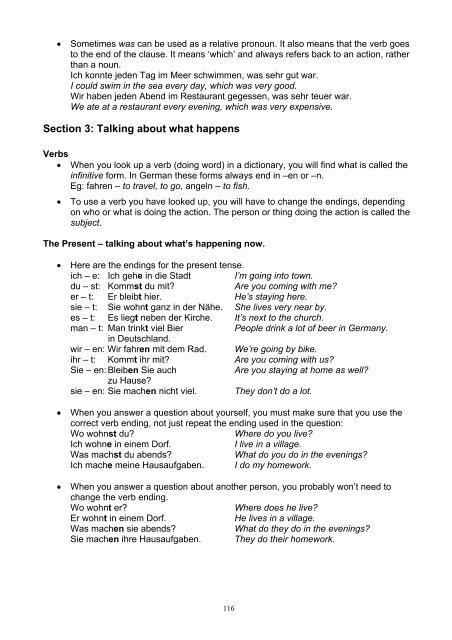VOCABULARY - AQA
VOCABULARY - AQA
VOCABULARY - AQA
You also want an ePaper? Increase the reach of your titles
YUMPU automatically turns print PDFs into web optimized ePapers that Google loves.
• Sometimes was can be used as a relative pronoun. It also means that the verb goes<br />
to the end of the clause. It means ‘which’ and always refers back to an action, rather<br />
than a noun.<br />
Ich konnte jeden Tag im Meer schwimmen, was sehr gut war.<br />
I could swim in the sea every day, which was very good.<br />
Wir haben jeden Abend im Restaurant gegessen, was sehr teuer war.<br />
We ate at a restaurant every evening, which was very expensive.<br />
Section 3: Talking about what happens<br />
Verbs<br />
• When you look up a verb (doing word) in a dictionary, you will find what is called the<br />
infinitive form. In German these forms always end in –en or –n.<br />
Eg: fahren – to travel, to go, angeln – to fish.<br />
• To use a verb you have looked up, you will have to change the endings, depending<br />
on who or what is doing the action. The person or thing doing the action is called the<br />
subject.<br />
The Present – talking about what’s happening now.<br />
• Here are the endings for the present tense.<br />
ich – e: Ich gehe in die Stadt I’m going into town.<br />
du – st: Kommst du mit? Are you coming with me?<br />
er – t: Er bleibt hier. He’s staying here.<br />
sie – t: Sie wohnt ganz in der Nähe. She lives very near by.<br />
es – t: Es liegt neben der Kirche. It’s next to the church.<br />
man – t: Man trinkt viel Bier People drink a lot of beer in Germany.<br />
in Deutschland.<br />
wir – en: Wir fahren mit dem Rad. We’re going by bike.<br />
ihr – t: Kommt ihr mit? Are you coming with us?<br />
Sie – en: Bleiben Sie auch Are you staying at home as well?<br />
zu Hause?<br />
sie – en: Sie machen nicht viel. They don’t do a lot.<br />
• When you answer a question about yourself, you must make sure that you use the<br />
correct verb ending, not just repeat the ending used in the question:<br />
Wo wohnst du? Where do you live?<br />
Ich wohne in einem Dorf. I live in a village.<br />
Was machst du abends? What do you do in the evenings?<br />
Ich mache meine Hausaufgaben. I do my homework.<br />
• When you answer a question about another person, you probably won’t need to<br />
change the verb ending.<br />
Wo wohnt er? Where does he live?<br />
Er wohnt in einem Dorf. He lives in a village.<br />
Was machen sie abends? What do they do in the evenings?<br />
Sie machen ihre Hausaufgaben. They do their homework.<br />
116


